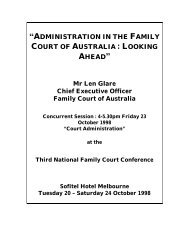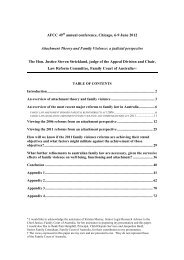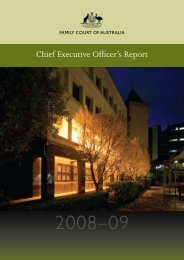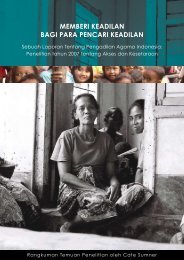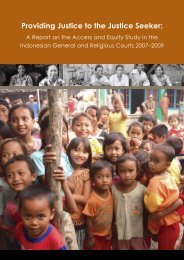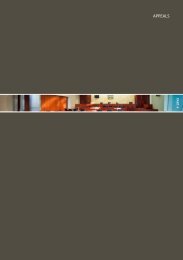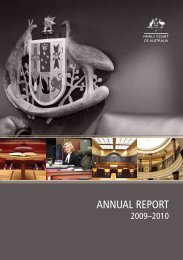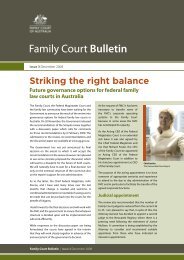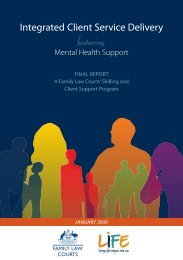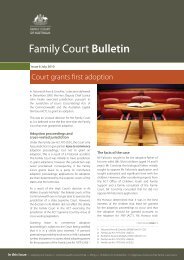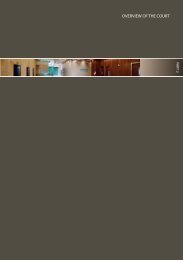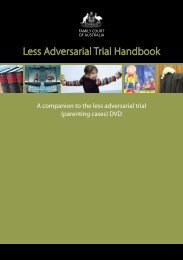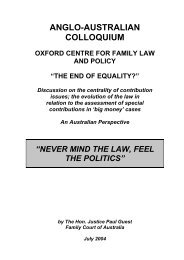Significant and Noteworthy Judgments - Family Court of Australia
Significant and Noteworthy Judgments - Family Court of Australia
Significant and Noteworthy Judgments - Family Court of Australia
Create successful ePaper yourself
Turn your PDF publications into a flip-book with our unique Google optimized e-Paper software.
significant <strong>and</strong> noteworthy judgments
<strong>Family</strong> <strong>Court</strong> <strong>of</strong> <strong>Australia</strong> – Annual Report 2007–2008<br />
SIGNIFICANT AND NOTEWORTHY JUDGMENTS<br />
In the past year, judges <strong>of</strong> the <strong>Family</strong> <strong>Court</strong> <strong>of</strong> <strong>Australia</strong> have h<strong>and</strong>ed down judgments at both first instance<br />
<strong>and</strong> appellate levels. The decisions reflect the <strong>Court</strong>’s expansive jurisdiction, the wide variety <strong>of</strong> issues that<br />
it addresses, <strong>and</strong> its position as a superior specialist <strong>Court</strong> which deals with the most complex <strong>and</strong> serious<br />
<strong>of</strong> family law cases. A selection <strong>of</strong> the more significant <strong>and</strong> noteworthy <strong>of</strong> those judgments is published<br />
below.<br />
The <strong>Court</strong> recognises that accessibility <strong>of</strong> its judgments to the public is very important <strong>and</strong> it commits<br />
the resources required to ensure that every final judgment delivered is anonymised <strong>and</strong>, consistent with<br />
section 121 <strong>of</strong> the <strong>Family</strong> Law Act 1975, published. Virtually all judgments, after anonymisation, are now<br />
published in full text on the Australasian Legal Information Institute (AustLII) website. There is a link to this<br />
site from the <strong>Court</strong>’s website (www.familycourt.gov.au). Recent decisions are also published on the <strong>Court</strong>’s<br />
website for a period <strong>of</strong> two months.<br />
This policy has enabled the <strong>Court</strong> to better respond to community interest <strong>and</strong> concerns about particular<br />
cases highlighted in the media.<br />
Note: The following summaries <strong>of</strong> Full <strong>Court</strong> cases are largely based on headnotes by CCH <strong>Family</strong> Law<br />
Editors.<br />
FULL COURT JUDGMENTS<br />
PART 5<br />
LGM <strong>and</strong> CAM (Contempt)<br />
[2008] FamCAFC 1, (2008) FLC 93–355, (2008) 38 Fam LR 229.<br />
<strong>Family</strong> law — Appeal — Contempt — Contravention <strong>of</strong> court order — Sanctions —<br />
Whether the trial judge erred in concluding the wife was aware <strong>of</strong> the terms <strong>of</strong> the orders<br />
— Whether incorrect conclusions drawn — Whether the penalty was plainly unjust —<br />
<strong>Family</strong> Law Act 1975 (Cth), s 112AD(1), s 112AP, s 117.<br />
Full <strong>Court</strong> <strong>of</strong> the <strong>Family</strong> <strong>Court</strong> <strong>of</strong> <strong>Australia</strong> before Bryant CJ, Finn <strong>and</strong> Warnick JJ, judgment<br />
delivered 10 January 2008.<br />
In this case the Full <strong>Court</strong> had to decide whether the conviction <strong>of</strong> a wife for contempt<br />
<strong>of</strong> court <strong>and</strong> the resulting four month prison sentence should be set aside. There was<br />
a dispute as to whether the wife was aware <strong>of</strong> the orders which she had breached <strong>and</strong><br />
further, as to whether the prison sentence was unjust. The wife also appealed the order<br />
for indemnity costs made against her.<br />
The relevant facts can be shortly stated. Interlocutory orders made in 1999 restrained<br />
the parties from dealing with any real property in which they had an interest. In 2001<br />
the wife mortgaged real property in which she had an interest. In 2003 the wife sold her<br />
interest in another property. The husb<strong>and</strong> brought an application for contempt. The trial<br />
judge sentenced the wife to four months’ imprisonment <strong>and</strong> ordered that the wife pay<br />
the husb<strong>and</strong>’s costs <strong>of</strong> the contempt proceedings on an indemnity basis.<br />
SIGNIFICANT AND NOTEWORTHY JUDGMENTS<br />
75
The wife submitted that the trial judge erred in concluding as a fact that the wife was<br />
aware <strong>of</strong> the terms <strong>of</strong> the orders made, <strong>and</strong> instead should have found that the absence<br />
<strong>of</strong> special service by h<strong>and</strong> <strong>of</strong> the amended application for contempt resulted in the<br />
failure <strong>of</strong> the application. The wife also submitted that the trial judge drew incorrect<br />
conclusions about the wife’s attempts to purge her contempt <strong>and</strong> imposed a plainly<br />
unjust penalty. The trial judge wrongly took into account findings central to the<br />
conclusion <strong>of</strong> contempt, for which the wife had already been punished. In relation to<br />
the indemnity costs order, the wife submitted that the trial judge failed to take account<br />
<strong>of</strong> the absence <strong>of</strong> evidence about the basis on which the husb<strong>and</strong>’s costs were charged or<br />
their quantum.<br />
The appeal was allowed only in relation to the quantum <strong>of</strong> the costs order against the<br />
wife, as no evidence had been led substantiating the husb<strong>and</strong>’s costs. The appeal was<br />
otherwise dismissed.<br />
SIGNIFICANT AND NOTEWORTHY JUDGMENTS PART 5<br />
Bryant CJ <strong>and</strong> Warnick J held that the inference drawn by the trial judge (beyond<br />
reasonable doubt) was open to him. They found that there was no question <strong>of</strong> whether<br />
or not the wife was aware <strong>of</strong> the orders <strong>and</strong> there was no error in the weight that the<br />
trial judge gave to relevant factors or in the terms he used to describe them. There<br />
was no error in the trial judge’s reasons for rejecting a fine, which included not just a<br />
consideration <strong>of</strong> the financial consequences, but the deliberation in <strong>and</strong> seriousness<br />
<strong>of</strong> the wife’s actions 'notwithst<strong>and</strong>ing the mitigating factors'. The fact <strong>and</strong> term <strong>of</strong><br />
imprisonment was well in line with penalties imposed. The sentence imposed was not<br />
manifestly excessive.<br />
Finn J held that the trial judge did not err in failing to find that the amended application<br />
for contempt should fail because <strong>of</strong> the absence <strong>of</strong> special service by h<strong>and</strong>. The<br />
conclusion the trial judge arrived at (beyond reasonable doubt) was clearly open to him,<br />
particularly in circumstances where the wife had chosen to call no evidence.<br />
There was no error in the trial judge’s reasoning or his conclusion concerning the<br />
limitations or shortcomings <strong>of</strong> the wife’s endeavours to purge her contempts. There<br />
was no basis on which the court would be justified in interfering with the trial judge’s<br />
decision as to a penalty.<br />
76
<strong>Family</strong> <strong>Court</strong> <strong>of</strong> <strong>Australia</strong> – Annual Report 2007–2008<br />
Black & Black<br />
[2008] FamCAFC 7, (2008) FLC 93–357.<br />
<strong>Family</strong> law — Appeal — Property — Financial agreement — Statutory requirements —<br />
Whether agreement complied with statutory requirements — Whether agreement met the<br />
requirements <strong>of</strong> s 90G — <strong>Family</strong> Law Act 1975 (Cth), s 71A, s 90G.<br />
Full <strong>Court</strong> <strong>of</strong> the <strong>Family</strong> <strong>Court</strong> <strong>of</strong> <strong>Australia</strong> before Faulks DCJ, Kay <strong>and</strong> Penny JJ, judgment<br />
delivered 24 January 2008.<br />
The primary issue for the Full <strong>Court</strong> in this case was whether to set aside a financial<br />
agreement due to the fact that the requirements which make agreements binding under<br />
the legislation had not been strictly complied with.<br />
This was an appeal by the husb<strong>and</strong> against an order dismissing his application to set<br />
aside a financial agreement entered into by himself <strong>and</strong> his wife.<br />
The husb<strong>and</strong> initiated proceedings seeking to set aside the financial agreement <strong>and</strong><br />
sought orders that the assets <strong>of</strong> the parties be divided 80/20 in his favour, rather than<br />
50/50, to take into account his significantly larger financial contribution. The trial judge<br />
concluded there was a binding agreement <strong>and</strong> none <strong>of</strong> the matters raised by the husb<strong>and</strong><br />
which might allow him to interfere with the agreement were proven.<br />
On appeal, the husb<strong>and</strong> sought to have the agreement set aside on the basis that it did<br />
not comply with the statutory requirements for a binding financial agreement pursuant<br />
to s 90G <strong>of</strong> the <strong>Family</strong> Law Act (as it was prior to the 2004 amendments).<br />
The Full <strong>Court</strong> allowed the appeal <strong>and</strong> set aside the agreement. They noted that<br />
s 90G(1)(b) (as it was prior to the 2004 amendments) expressly required that the<br />
agreement contain a statement from each party that, before they executed the agreement,<br />
they received independent legal advice from a legal practitioner in relation to the matters<br />
referred to in (i) to (iv). The section also went on to provide that the agreement must<br />
also annexe a certificate executed by that legal practitioner stating that the advice in<br />
relation to the matters referred to in (i) to (iv) was provided to that party.<br />
The <strong>Court</strong> found that the agreement entered into by the parties did not refer to the<br />
specific requirements detailed in s 90G, although the certificate did. Such an omission<br />
meant that the agreement did not comply with the provisions <strong>of</strong> s 90G <strong>and</strong> was not<br />
binding upon the parties. Strict compliance with the statutory requirements is necessary<br />
to eliminate the court’s jurisdiction to make adjustive orders under s 79.<br />
PART 5<br />
SIGNIFICANT AND NOTEWORTHY JUDGMENTS<br />
77
Truman & Truman<br />
[2008] FamCAFC 4, (2008) FLC 93–360.<br />
<strong>Family</strong> law — Appeal — Parenting — Less adversarial trial — Interim proceedings —<br />
Right to appeal — Whether r 22.03 precludes an appeal being filed until the last order<br />
has been made — Whether the trial judge erred in his approach in determining interim<br />
proceedings — Whether the trial judge was obliged to give reasons why he was departing<br />
from the orders each party was seeking — <strong>Family</strong> Law Act 1975 (Cth), s 60CC, s 65DAA, s<br />
68T, s 69ZR, s 93, s 94, s 123, s 125.<br />
Full <strong>Court</strong> <strong>of</strong> the <strong>Family</strong> <strong>Court</strong> <strong>of</strong> <strong>Australia</strong> before Bryant CJ, Kay <strong>and</strong> Thackray JJ, judgment<br />
delivered 21 January 2008.<br />
In this case the Full <strong>Court</strong> had to determine, amongst other things, whether the <strong>Family</strong><br />
Law Rules were ultra vires in so far as they purported to prevent an appeal against<br />
interim parenting orders made during, but before the conclusion <strong>of</strong>, the final hearing.<br />
SIGNIFICANT AND NOTEWORTHY JUDGMENTS PART 5<br />
This was an appeal by the father against orders made at the conclusion <strong>of</strong> the first day <strong>of</strong><br />
a less adversarial trial (LAT). The father sought that time be extended to permit him to<br />
appeal the orders.<br />
The father’s appeal raised the question <strong>of</strong> the extent to which an order had the effect <strong>of</strong><br />
precluding him from appealing <strong>and</strong>, if so, whether the court had power to make such an<br />
order. Further, to the extent that such an order was made in reliance upon r 22.03(2) <strong>of</strong><br />
the Rules, whether the rule was ultra vires <strong>of</strong> the Act <strong>and</strong> the power <strong>of</strong> the court.<br />
The father submitted that the trial judge erred in failing to have regard to the material<br />
filed by the parties in the interim proceedings. The trial judge was said to err in accepting<br />
<strong>and</strong> relying on the evidence <strong>of</strong> the mother in circumstances where such evidence was in<br />
issue between the parties <strong>and</strong> there was no testing <strong>of</strong> the evidence. The father submitted<br />
that the trial judge erred in his approach to, <strong>and</strong> acceptance <strong>of</strong> aspects <strong>of</strong> the evidence<br />
<strong>of</strong> the family consultant, <strong>and</strong> erred in failing to properly apply the principles relevant to<br />
interim parenting determinations including s 60CC <strong>and</strong> s 65DAA.<br />
The Full <strong>Court</strong> held that the father was permitted to appeal as it was held that<br />
r 22.03(2), ins<strong>of</strong>ar as it purported to have the effect <strong>of</strong> precluding either party from<br />
lodging an appeal against any order made during the LAT until the entire proceedings<br />
are concluded, was ultra vires <strong>of</strong> the court’s power.<br />
However, regarding the substantive appeal, the Full <strong>Court</strong> held that the trial judge was<br />
entitled to exclude the affidavit evidence <strong>of</strong> both parties. Even though there was an<br />
interim issue to be resolved, the decision about what issues required determination <strong>and</strong><br />
what evidence was to be given by whom <strong>and</strong> in what manner was an issue that the trial<br />
judge had to determine. Furthermore, there was nothing to suggest that the trial judge<br />
had placed undue weight on the opinion <strong>of</strong> the family consultant that the parties had<br />
unresolved conflicts on personal issues which impacted on the children. The trial judge<br />
correctly followed the legislative framework in s 65DAA.<br />
78
<strong>Family</strong> <strong>Court</strong> <strong>of</strong> <strong>Australia</strong> – Annual Report 2007–2008<br />
The substance <strong>of</strong> the appeal therefore succeeded only in relation to the trial judge’s<br />
unsupported finding that the mother had altered her position regarding holidays. The<br />
trial judge ought to have given reasons for departing from the orders sought by the<br />
parties. The matter was remitted to the trial judge for rehearing as part <strong>of</strong> the continuing<br />
LAT process.<br />
Sampson & Hartnett (No 10)<br />
[2007] FamCA 1365, (2007) FLC 93–350, (2008) 38 Fam LR 315.<br />
<strong>Family</strong> law — Appeal — Parenting — Relocation — Power <strong>of</strong> court to directly or<br />
effectively order a parent to relocate — Effect <strong>of</strong> Constitution on parenting orders<br />
requiring or preventing interstate relocation — <strong>Family</strong> Law Act 1975 (Cth), s 65DAA, s<br />
114(3) — The Constitution, s 92.<br />
Full <strong>Court</strong> <strong>of</strong> the <strong>Family</strong> <strong>Court</strong> <strong>of</strong> <strong>Australia</strong> before Bryant CJ, Kay <strong>and</strong> Warnick JJ, judgment<br />
delivered 22 November 2007.<br />
The members <strong>of</strong> the Full <strong>Court</strong> on this occasion had to consider chiefly whether the<br />
<strong>Family</strong> Law Act gives the <strong>Court</strong> the power to order a parent to relocate to another city<br />
in the best interests <strong>of</strong> the children. There was a further dispute about whether the trial<br />
judge had considered all relevant scenarios <strong>and</strong> all relevant factors required under the<br />
<strong>Family</strong> Law Act.<br />
This was an appeal by the mother against a parenting order which provided that the<br />
parents have equal shared parental responsibility for the children, that the children’s<br />
residence be established in Sydney <strong>and</strong> that, following relocation <strong>of</strong> the children’s<br />
residence to Sydney, the time the children spend with the father be gradually increased<br />
to each alternate week.<br />
Following separation, the mother moved from Sydney to Geelong with one child, the<br />
second child being born a few months thereafter. At the trial the father indicated he<br />
would live in Sydney <strong>and</strong> the mother indicated she would live in Geelong.<br />
On appeal, the mother submitted that the trial judge failed to have regard to <strong>and</strong><br />
articulate the matters referred to in s 65DAA <strong>of</strong> the Act. The mother proposed that the<br />
children continue to live with her in Geelong <strong>and</strong> that they spend time with the father.<br />
The father submitted that, in the event the appeal was allowed, the matter be remitted<br />
for further consideration by the trial judge.<br />
The appeal was allowed. Bryant CJ <strong>and</strong> Warnick J held that there is power under s<br />
114(3) <strong>of</strong> the Act to enjoin a parent from relocating or to relocate, provided that that<br />
injunction is no more than is necessary to secure the best interests <strong>of</strong> a child. However,<br />
the strength <strong>of</strong> factors supporting the mother’s proposal in this case reinforced the<br />
need for close scrutiny <strong>of</strong> alternatives. The trial judge only addressed two alternatives.<br />
The trial judge did not fully address the prospect that the father’s relationship with the<br />
children might be advanced by contact over a period in the Geelong area <strong>and</strong> perhaps<br />
PART 5<br />
SIGNIFICANT AND NOTEWORTHY JUDGMENTS<br />
79
subsequently, for longer periods in Sydney to a stage where, if the mother chose not to<br />
return to Sydney to live, the better order might be that the children live with the father.<br />
The trial judge did not address the practicality <strong>of</strong> the mother relocating to <strong>and</strong> remaining<br />
in Sydney.<br />
Kay J held that the orders made by the trial judge were too uncertain <strong>and</strong> appeared to be<br />
incapable <strong>of</strong> enforcement. The legislative requirement under s 65DAA(5) is m<strong>and</strong>atory.<br />
The obligation <strong>of</strong> the trial judge is to pay regard to the matters contained therein. The<br />
trial judge is also obliged to explain the manner in which she has regard to those matters<br />
where she intends to make orders which are not on their face immediately capable <strong>of</strong><br />
implementation.<br />
Kilah & Director-General, Department <strong>of</strong> Community Services<br />
[2008] FamCAFC 81<br />
SIGNIFICANT AND NOTEWORTHY JUDGMENTS PART 5<br />
CHILD ABDUCTION – HAGUE CONVENTION – HABITUAL RESIDENCE – whether the children<br />
were habitually resident in <strong>Australia</strong> at the time <strong>of</strong> their retention – whether the mother<br />
had a settled intention not to return to Israel with the children – discussion <strong>of</strong> <strong>Australia</strong>n,<br />
New Zeal<strong>and</strong> <strong>and</strong> English authorities on the term ‘habitual residence’ – appeal dismissed<br />
CHILD ABDUCTION – HAGUE CONVENTION – FRESH EVIDENCE – where the mother sought<br />
to adduce fresh evidence <strong>of</strong> the children’s acclimatisation in <strong>Australia</strong> – where the Central<br />
Authority sought to adduce fresh evidence <strong>of</strong> legal proceedings instituted by the father in<br />
Israel – applications dismissed<br />
Full <strong>Court</strong> <strong>of</strong> the <strong>Family</strong> <strong>Court</strong> <strong>of</strong> <strong>Australia</strong> before Bryant CJ, Coleman <strong>and</strong> Thackray JJ<br />
The question for the Full <strong>Court</strong> was whether children should be ordered to return to<br />
Israel under the Hague Child Abduction Convention. The major dispute was whether<br />
the children were 'habitually resident' in Israel (as required for a return order under the<br />
Convention) at the time they were retained in <strong>Australia</strong>.<br />
This was an appeal by the mother against orders <strong>of</strong> Kay J requiring her to return to<br />
Israel with the parties’ four children pursuant to the provisions <strong>of</strong> the <strong>Family</strong> Law<br />
(Child Abduction Convention) Regulations 1986 (Cth) (“the Regulations”). The Central<br />
Authority resisted the mother’s appeal. The mother raised a number <strong>of</strong> grounds on<br />
appeal but the majority <strong>of</strong> the submissions were directed towards Kay J’s alleged failure<br />
to find that the children were habitually resident in <strong>Australia</strong> at the time they were<br />
retained there by the mother. Submissions were also directed to the issue <strong>of</strong> whether Kay<br />
J erred in failing to find that the mother’s settled intention, consented to by the father,<br />
was that she <strong>and</strong> the children leave Israel <strong>and</strong> remain in <strong>Australia</strong> on a semi-permanent<br />
basis. Counsel for the mother submitted that this was sufficient to bring about a loss <strong>of</strong><br />
habitual residence upon departure from Israel.<br />
The facts are as follows. In May 2006 the mother <strong>and</strong> children left Israel to travel<br />
to <strong>Australia</strong> with the father’s consent. The mother’s case was that she left on an<br />
80
<strong>Family</strong> <strong>Court</strong> <strong>of</strong> <strong>Australia</strong> – Annual Report 2007–2008<br />
underst<strong>and</strong>ing that if the father advised her that the marriage was over, she would not be<br />
returning with the children <strong>and</strong> would settle permanently with them in <strong>Australia</strong>. The<br />
father asserted that the mother left for a fixed period only <strong>and</strong> that he never consented to<br />
the children remaining away from Israel on any permanent basis.<br />
On the issue <strong>of</strong> where the children were habitually resident at the time they were<br />
retained by the mother in <strong>Australia</strong>, the mother relied on two New Zeal<strong>and</strong> authorities,<br />
SK v KP [2005] 3 NZLR 590 <strong>and</strong> Punter v Secretary for Justice [2007] 1 NZLR 40 in<br />
support <strong>of</strong> her contention that Kay J should have undertaken a broad factual inquiry<br />
in determining the children’s habitual residence, rather than focussing on the 'settled<br />
intention' <strong>of</strong> the parties. The mother contended that the children’s habitual residence in<br />
Israel was lost immediately upon their departure from that country. In the alternative,<br />
the mother argued that the children had acquired a new habitual residence in <strong>Australia</strong><br />
after an appreciable period <strong>of</strong> residence. The mother sought to adduce fresh evidence <strong>of</strong><br />
the children’s circumstances in <strong>Australia</strong> in support <strong>of</strong> her alternative ground <strong>of</strong> appeal.<br />
The Full <strong>Court</strong> dismissed the applications to adduce fresh evidence <strong>and</strong> the appeal.<br />
They held that when the mother <strong>and</strong> children left Israel the issue <strong>of</strong> whether they would<br />
return or not was dependent upon the father informing the mother that the marriage<br />
was over, <strong>and</strong> by the time that occurred, the father was already seeking to have the<br />
children returned. The communication to the mother that the marriage would not<br />
continue did not immediately trigger an expression <strong>of</strong> unequivocal intention by her to<br />
remain in <strong>Australia</strong> with the children. Many <strong>of</strong> the events sought to be relied upon by<br />
the mother in support <strong>of</strong> her argument that the children had acquired habitual residence<br />
in <strong>Australia</strong> occurred prior to the mother’s departure from Israel <strong>and</strong> were neither<br />
consistent nor inconsistent with the settled intention or the acquisition <strong>of</strong> a new habitual<br />
residence. It was the mother who was seeking to bring about an 'acclimatisation' <strong>of</strong> the<br />
children in <strong>Australia</strong> in circumstances where she was aware <strong>of</strong> the father’s desire to have<br />
them returned to Israel. The <strong>Court</strong> should be slow to infer a change in habitual residence<br />
in the absence <strong>of</strong> a shared parental attempt to bring it about.<br />
The Full <strong>Court</strong> did not need to resolve the apparently significant departure <strong>of</strong> the New<br />
Zeal<strong>and</strong> courts from established <strong>Australia</strong>n <strong>and</strong> English authority in order to determine<br />
the appeal.<br />
PART 5<br />
SIGNIFICANT AND NOTEWORTHY JUDGMENTS<br />
Karim & Khalid<br />
[2007] FamCA 1287; (2007) FLC 93–348; (2008) 38 Fam LR 300<br />
<strong>Family</strong> law — Appeal — Parenting — Application for return <strong>of</strong> child — Non-Hague<br />
Convention country — Forum non conveniens principles — Best interests <strong>of</strong> the child —<br />
<strong>Family</strong> Law Act 1975 (Cth), s 67ZC.<br />
In the Full <strong>Court</strong> <strong>of</strong> the <strong>Family</strong> <strong>Court</strong> <strong>of</strong> <strong>Australia</strong> before Finn, Coleman <strong>and</strong> May JJ,<br />
judgment delivered 1 November 2007.<br />
81
In this case the Full <strong>Court</strong> had to determine what test should be applied when a parent<br />
seeks to take a child out <strong>of</strong> <strong>Australia</strong> to a country that is not a party to the Hague Child<br />
Abduction Convention.<br />
This was an appeal by the husb<strong>and</strong> against an order, the effect <strong>of</strong> which was to refuse,<br />
on an interim basis, the husb<strong>and</strong>’s application for the return to Pakistan <strong>of</strong> the child <strong>of</strong><br />
the parties’ marriage <strong>and</strong> to order that the child live with the wife <strong>and</strong> spend gradually<br />
increasing time with the husb<strong>and</strong>.<br />
The wife had brought the child to <strong>Australia</strong> from Pakistan without the husb<strong>and</strong>’s<br />
knowledge or consent. Pakistan is not a party to the Hague Convention on the Civil<br />
Aspects <strong>of</strong> International Child Abduction.<br />
On appeal, the husb<strong>and</strong> submitted that an order should be made for the return <strong>of</strong> the<br />
child to Pakistan. His argument essentially was that the trial judge erred in reaching his<br />
decision by having regard to the doctrine <strong>of</strong> forum non conveniens <strong>and</strong> by failing to<br />
regard the child’s best interests as the paramount consideration.<br />
SIGNIFICANT AND NOTEWORTHY JUDGMENTS PART 5<br />
The wife, supported by the independent children’s lawyer, resisted the appeal <strong>and</strong><br />
asserted that in determining the case the trial judge had applied the principles which he<br />
had been requested to apply by both the husb<strong>and</strong> <strong>and</strong> the wife.<br />
The Full <strong>Court</strong> dismissed the husb<strong>and</strong>’s appeal. Although the trial judge was in<br />
error in applying the principle <strong>of</strong> 'forum non conveniens' or 'clearly inappropriate<br />
forum', he had been led into error by the parties. The sole principle which governs the<br />
determination <strong>of</strong> an application for the return <strong>of</strong> a child from <strong>Australia</strong> to a foreign non-<br />
Convention country is the best interests <strong>of</strong> the child. Forum non conveniens principles<br />
are not relevant to such an application.<br />
In the course <strong>of</strong> applying the forum non conveniens principles, the trial judge carried<br />
out a relatively exhaustive analysis <strong>of</strong> the matters contained in s 68F(2) <strong>of</strong> the Act, to<br />
which a court must have regard in determining for purposes <strong>of</strong> the Act what is in the<br />
best interests <strong>of</strong> a child.<br />
The trial judge’s findings in relation to s 68F(2) were sufficient to support a conclusion<br />
that it would not be in the child’s best interest to order, at least on a summary basis, that<br />
she should be returned to Pakistan.<br />
82
<strong>Family</strong> <strong>Court</strong> <strong>of</strong> <strong>Australia</strong> – Annual Report 2007–2008<br />
R<strong>and</strong> & Ors & R<strong>and</strong><br />
[2004] FamCAFC 50; (2008) FLC 93–370<br />
<strong>Family</strong> law — Appeals — Property — <strong>Family</strong> Trust — Ownership <strong>of</strong> company shares by<br />
trust — Whether the trial judge erred in ordering an allotment <strong>of</strong> shares in the company<br />
be set aside <strong>and</strong> expunged — Power to make orders under s 90AE <strong>of</strong> the <strong>Family</strong> Law Act<br />
1975 (Cth) — Whether the trial judge erred in finding he had power to make orders under<br />
s 90AE(1)(b) — Judgement — Adequacy <strong>of</strong> reasons — Whether the trial judge provided<br />
adequate reasons — <strong>Family</strong> Law Act 1975 (Cth), s 106B, s 90AE.<br />
In the Full <strong>Court</strong> <strong>of</strong> the <strong>Family</strong> <strong>Court</strong> <strong>of</strong> <strong>Australia</strong> before Finn, May <strong>and</strong> Bol<strong>and</strong> JJ, judgment<br />
delivered 29 April 2008.<br />
The dispute before the Full <strong>Court</strong> centred on the extent <strong>and</strong> nature <strong>of</strong> the powers <strong>of</strong> the<br />
<strong>Family</strong> <strong>Court</strong> to make orders which impact on third party individuals <strong>and</strong> corporate<br />
entities.<br />
Various third parties appealed orders made in property settlement proceedings between a<br />
husb<strong>and</strong> <strong>and</strong> a wife.<br />
In the first appeal, the husb<strong>and</strong>’s parents <strong>and</strong> two companies associated with the<br />
husb<strong>and</strong>’s father appealed against orders 1, 5, 6 <strong>and</strong> 7 <strong>of</strong> the trial judge.<br />
By order 1, the trial judge ordered that a company <strong>of</strong> the husb<strong>and</strong> <strong>and</strong> the wife, in<br />
liquidation, <strong>and</strong>/or its liquidator, assign to the wife any entitlement it had in any debt<br />
owed to it by, or cause <strong>of</strong> action it had against, various third parties.<br />
By order 5, the trial judge restrained, on an interim basis, nine parties from pursuing any<br />
claim against the husb<strong>and</strong>, the wife or their company (in liquidation), including claims<br />
in relation to directors’ loan accounts or asserted insolvent trading.<br />
By order 6, the trial judge ordered, pursuant to s 90AE(1)(b) <strong>of</strong> the <strong>Family</strong> Law Act 1975<br />
(Cth) that the husb<strong>and</strong> be substituted for the wife in respect <strong>of</strong> any alleged indebtedness<br />
<strong>of</strong> the wife to the nine parties.<br />
By order 7, the trial judge ordered, pursuant to s 106B, that an allotment <strong>of</strong> shares be set<br />
aside <strong>and</strong> that the shares be expunged from the share register.<br />
The grounds <strong>of</strong> the first appeal were:<br />
The trial judge erred in finding he had power to make orders 1, 5, 6 <strong>and</strong> 7.<br />
In the alternative, in the event the trial judge had power to make orders 1, 5, 6 <strong>and</strong><br />
7, he should not, in the exercise <strong>of</strong> his discretion, have made those orders.<br />
The trial judge failed to give any or sufficient weight to the evidence <strong>of</strong> the<br />
appellant.<br />
The trial judge gave insufficient reasons for orders 1, 5, 6 <strong>and</strong> 7.<br />
PART 5<br />
SIGNIFICANT AND NOTEWORTHY JUDGMENTS<br />
83
In the second appeal, a company in liquidation in which the husb<strong>and</strong> <strong>and</strong> the wife were<br />
previously the shareholders, <strong>and</strong> <strong>of</strong> which they were also the directors, together with the<br />
liquidator <strong>of</strong> that company, appealed against orders 5, 6 <strong>and</strong> 9.<br />
By order 9, the trial judge ordered, pursuant to s 90AE(1)(b), that the company<br />
in liquidation do all acts <strong>and</strong> things necessary to substitute the husb<strong>and</strong> for any<br />
indebtedness to the company by the wife pursuant to any loan account or as a<br />
consequence <strong>of</strong> alleged insolvent trading.<br />
The grounds <strong>of</strong> the second appeal were as follows:<br />
The trial judge erred in finding he had power to make orders 5, 6 <strong>and</strong> 9.<br />
The trial judge erred in finding that it was appropriate to make orders 5, 6 <strong>and</strong> 9.<br />
The trial judge erred in finding that the ground existed to justify the making <strong>of</strong><br />
orders 5, 6 <strong>and</strong> 9.<br />
The trial judge failed to give any or, in the alternative, any sufficient reasons for<br />
orders 5, 6 <strong>and</strong> 9 that were made<br />
SIGNIFICANT AND NOTEWORTHY JUDGMENTS PART 5<br />
The appeals were allowed.<br />
The findings by the trial judge that the trustee was never on the register <strong>of</strong> shareholders,<br />
<strong>and</strong> that his appointment as trustee <strong>of</strong> the family trust was not effective, were not<br />
challenged. Thus, there could be no substance in the limited challenge to order 7 based<br />
on alleged consent by the trustee to the allotment <strong>of</strong> shares. However, the trial judge did<br />
not explain, as he was bound by the legislation to do, why the orders under s 90AE(1)(b)<br />
were 'reasonably necessary to effect a division <strong>of</strong> property' between the husb<strong>and</strong> <strong>and</strong> the<br />
wife.<br />
An insolvent trading claim under s 588M <strong>of</strong> the Corporations Act 2001 (Cth) cannot<br />
be categorised as a debt for purposes <strong>of</strong> s 90AE(1)(b). Therefore, there was no power to<br />
make the orders under s 90AE(1)(b) to the extent that those orders purported to extend<br />
a claim for insolvent trading.<br />
If the trial judge proposed to make the restraining order which he did, he would have<br />
had to have done so under s 90AF <strong>and</strong>, in doing so, would be required to address the<br />
matters set out in s 90AF(3) <strong>and</strong> s 90AF(4).<br />
84
<strong>Family</strong> <strong>Court</strong> <strong>of</strong> <strong>Australia</strong> – Annual Report 2007–2008<br />
FIRST INSTANCE JUDGMENTS<br />
Re Baby A<br />
[2008] FamCA 417<br />
MEDICAL PROCEDURES<br />
<strong>Family</strong> <strong>Court</strong> <strong>of</strong> <strong>Australia</strong> before Dessau J, judgment delivered 6 June 2008.<br />
The <strong>Family</strong> <strong>Court</strong> considered whether it was necessary for parents to seek a <strong>Family</strong> <strong>Court</strong><br />
order for experimental treatment on their terminally ill baby. The court noted that the<br />
parents may have been seen to have conflicting interests through their involvement in a<br />
pharmaceutical company, but also recognised that there was no other known hope for<br />
the baby.<br />
Baby A was five weeks old at the date <strong>of</strong> hearing. She had been diagnosed as suffering<br />
an extremely rare <strong>and</strong> fatal metabolic disorder, molybdenum c<strong>of</strong>actor deficiency type<br />
A. Toxins were building in the baby’s body that were causing her progressive irreparable<br />
neurological damage. There was no known cure or therapy. The baby was not expected<br />
to survive more than weeks or months.<br />
The baby’s parents brought an urgent application seeking various orders to enable<br />
the administration <strong>of</strong> an unapproved therapeutic drug, a substance known as 'cPMP<br />
precursor Z', as a rescue treatment for the baby. The substance cPMP precursor Z<br />
had not yet been used in humans. There had been laboratory testing overseas where it<br />
had been shown to be effective in mice. The baby’s mother was aware <strong>of</strong> the drug as<br />
she was a PhD biochemist in a company involved in the research <strong>and</strong> development <strong>of</strong><br />
pharmaceuticals. The court was provided with a list <strong>of</strong> possible side effects <strong>of</strong> the drug,<br />
but was told that nobody could be sure what would happen, given that the drug had not<br />
previously been used on humans.<br />
The medical experts in charge <strong>of</strong> the baby’s care <strong>and</strong> treatment were unanimous in<br />
supporting the treatment. An independent children’s lawyer <strong>and</strong> the Office <strong>of</strong> the Public<br />
Advocate also supported the parents’ application.<br />
The judge noted that, given that no other treatment options existed for the baby, it may<br />
have been open to the parents to consent to the treatment without the need for a court<br />
order. However, the judge acknowledged that the case did present difficult ethical issues<br />
<strong>and</strong> that the parents could be seen to have a potential conflict <strong>of</strong> interest given that the<br />
mother’s company was likely to produce <strong>and</strong> supply the treatment drug if it was to be<br />
used beyond the initial trial.<br />
Orders were made allowing the treatment.<br />
PART 5<br />
SIGNIFICANT AND NOTEWORTHY JUDGMENTS<br />
85
Re Inaya (Special Medical Procedure)<br />
[2007] FamCA 658<br />
<strong>Family</strong> <strong>Court</strong> <strong>of</strong> <strong>Australia</strong> before Justice Cronin, judgment delivered 27 June 2007.<br />
In this case the judge had to consider whether to permit a bone marrow transplant<br />
from a donor child (aged thirteen months at the hearing) to her first cousin (aged<br />
approximately eight months at the hearing) in circumstances where State law rendered<br />
such a transplant a criminal <strong>of</strong>fence.<br />
The facts can be briefly summarised as follows. A baby boy, given the pseudonym<br />
'Mansour Kamran', was born in September 2006. He suffered from Infantile<br />
Osteopetrosis, a hereditary disorder caused by a defect in the cells that normally cause<br />
bone resorption. Without a bone marrow transplant, Mansour was likely to die within a<br />
time period <strong>of</strong> between six months <strong>and</strong> five years. The bone marrow transplant was his<br />
only potential cure.<br />
SIGNIFICANT AND NOTEWORTHY JUDGMENTS PART 5<br />
Mansour had a one-year-old cousin 'Inaya Kamran' who had been born in March<br />
2006. Mansour’s mother <strong>and</strong> Inaya’s father are siblings. Further, Mansour’s father <strong>and</strong><br />
Inaya’s mother were first cousins <strong>and</strong> the two families had been connected in previous<br />
generations. As a result, the genetic make-up <strong>of</strong> Inaya <strong>and</strong> Mansour was actually closer<br />
than that <strong>of</strong> first cousins.<br />
Inaya’s parents applied to the <strong>Court</strong> for an order to authorise the taking <strong>of</strong> bone marrow<br />
from Inaya so that it could be transplanted into her cousin Mansour. An independent<br />
children’s lawyer from Victoria Legal Aid supported the parents’ application for the<br />
transplant.<br />
The judge noted that Inaya had been identified by testing as the most suitable donor for<br />
Mansour. One doctor estimated that Mansour would have a 50-60 per cent chance <strong>of</strong><br />
successful engraftment <strong>and</strong> cure were the proposed procedure to go ahead. The judge<br />
noted that the expert evidence was that the procedure <strong>of</strong> bone marrow harvest was not<br />
likely to have any long-term effects on Inaya.<br />
The major problem with the proposed transplant was that in Victoria, the Human Tissue<br />
Act prohibits the removal <strong>of</strong> tissue from children for transplantation. It is an <strong>of</strong>fence to<br />
do so. There is an exception where a parent consents in writing to the transplantation<br />
<strong>of</strong> the tissue to the body <strong>of</strong> a brother, a sister or a parent <strong>of</strong> the child who is likely to<br />
otherwise die. However, the judge noted that while this exception would apply to Inaya<br />
if she had been Mansour’s sister, it could not apply to Inaya as she was in fact Mansour’s<br />
cousin.<br />
The judge had to consider whether the <strong>Court</strong> had jurisdiction to make the requested<br />
orders in light <strong>of</strong> the fact that the proposed procedure was an <strong>of</strong>fence under the Human<br />
Tissue Act. The judge determined that consenting to the transplant procedure was<br />
within the scope <strong>of</strong> 'parental responsibility' under the <strong>Family</strong> Law Act. The <strong>Family</strong><br />
<strong>Court</strong> therefore had power to make an order regarding that exercise <strong>of</strong> parental<br />
86
<strong>Family</strong> <strong>Court</strong> <strong>of</strong> <strong>Australia</strong> – Annual Report 2007–2008<br />
responsibility. To the extent that the Human Tissue Act purports to prevent an<br />
order allowing the procedure, it is inconsistent with the <strong>Family</strong> Law Act. Section<br />
109 <strong>of</strong> the <strong>Australia</strong>n Constitution provides that if a State law is inconsistent with a<br />
Commonwealth law, the Commonwealth law prevails. The judge noted that the <strong>Family</strong><br />
Law Act is exclusive <strong>and</strong> exhaustive in relation to parental responsibility. The judge<br />
accordingly concluded that the <strong>Family</strong> Law Act, rather than the Human Tissue Act,<br />
must apply in Inaya’s case.<br />
The judge further noted that under the <strong>Family</strong> Law Act he could only make an order for<br />
the transplant if it was in Inaya’s best interests, even though the ultimate purpose <strong>of</strong> the<br />
transplant was for another child’s benefit. Inaya’s parents argued that it was in Inaya’s<br />
best interests to “grow up in a family where all possible was done within its power to<br />
avert grief rather than having experienced the trauma <strong>of</strong> losing a family member...”. The<br />
psychologist also urged the <strong>Court</strong> to consider how Inaya may feel in the event that her<br />
non-involvement in the procedure was the “cause” <strong>of</strong> Mansour’s death.<br />
The judge concluded that the relationship between Inaya <strong>and</strong> Mansour was <strong>of</strong> particular<br />
importance <strong>and</strong> should be preserved if possible. The judge acknowledged that Inaya may<br />
suffer psychological harm derived from guilt, self-blame <strong>and</strong> exposure to a traumatised<br />
<strong>and</strong> grief-stricken family <strong>and</strong> community, as well as the loss <strong>of</strong> important relationships if<br />
the procedure was not performed. The judge concluded that in all <strong>of</strong> the circumstances<br />
it was in the best interests <strong>of</strong> Inaya to enable her parents to lawfully consent to the<br />
transplant.<br />
PART 5<br />
SIGNIFICANT AND NOTEWORTHY JUDGMENTS<br />
87



